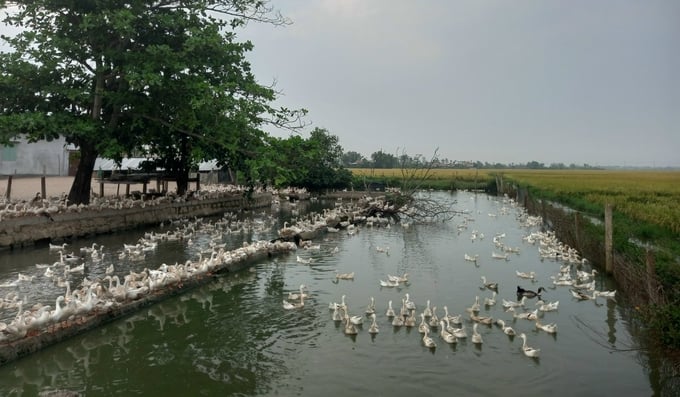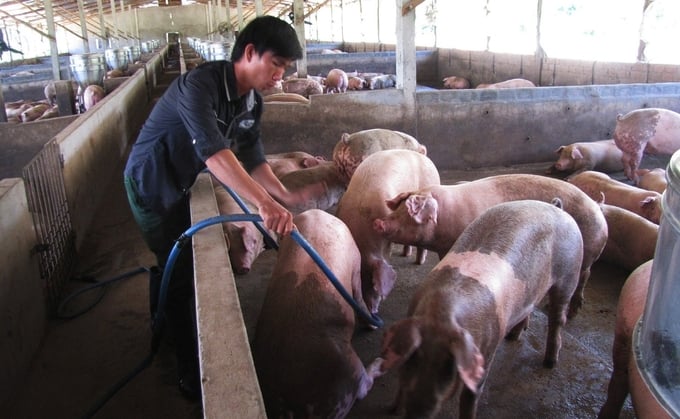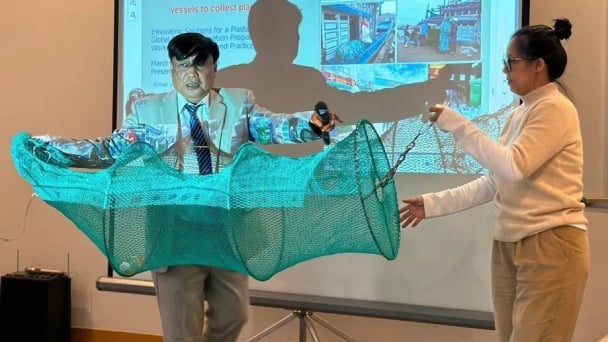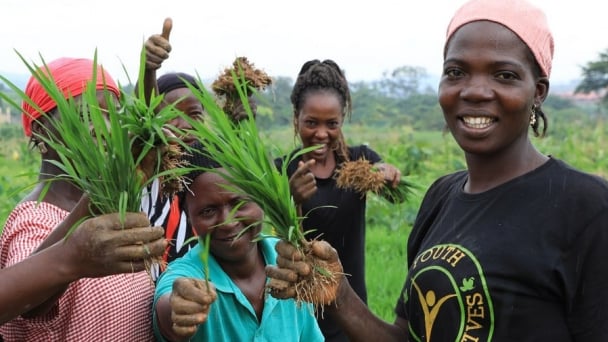May 14, 2025 | 15:34 GMT +7
May 14, 2025 | 15:34 GMT +7
Hotline: 0913.378.918
May 14, 2025 | 15:34 GMT +7
Hotline: 0913.378.918

Grassroots veterinary staff assists farmers in disease prevention and vaccination. Photo: KS.
Tay Hoa stands among the districts with a fairly large herd of livestock in Phu Yen province. According to Tran Khac Dung, Head of the district’s Livestock Production and Animal Health Station, Tay Hoa has a total of over 9,000 cows and buffaloes, 15,000 pigs, and a flock of 200,000 chickens. The grassroots veterinary system is maintained in 11 communes and towns, so livestock management as well as animal disease prevention and control are always guaranteed.
“For many years, the district's vaccination rate against foot-and-mouth disease has always been over 90%, and over 50% for pasteurellosis in cattle. Some communes and towns also give money to local farmers to buy pasteurellosis vaccines. As a result, no dangerous epidemics in livestock and poultry have occurred in the district," said Dung.

Tay Hoa’s poultry herd is growing and developing well. Photo: KS.
In Hoa Binh 1 commune (Tay Hoa), the livestock situation has had stable development since the start of the year. Tran Tien Man, a veterinary staff of Hoa Binh 1 commune, said that the whole commune has roughly 2,000 head of cattle, 78,000 head of poultry and 550 pigs.
Maintaining the commune’s record of no disease outbreak on cattle and poultry for the past few years, the veterinary force has taken the initiative and consulted the local authorities to closely monitor the disease situation and manage slaughterhouses in the vicinity. Every year, when the district constructs a plan for livestock development and disease prevention, the commune veterinary force also gives advice and concretizes the plan with the goal of well-implementing vaccination and veterinary hygiene.

The livestock situation in Phu Yen remains stable in 2023. Photo: KS.
Luong Cong Luan, a cattle fattening farmer in Phu Nong village (Hoa Binh 1 commune), said that his family's cows as well as those of neighbors have always been guaranteed to be disease-free. “It’s all thanks to the veterinary staff in the commune. They are always ready to give a helping hand in terms of disease prevention and control, and provide guidance on safe livestock farming measures”.
Every year, the veterinary force at district and commune levels organizes the spraying of disinfectants for livestock households while encouraging people to focus on vaccination to prevent dangerous diseases. Since then, livestock and poultry farming has developed well. In the case of Luan, his family raises cattle for fattening and sells a batch every 3 months (roughly 200 cows/year). After deducting expenses, Luan makes a profit of hundreds of millions of VND.
Unlike other provinces, Phu Yen does not merge the veterinary station with other units to form service centers under the management of the district People's Committee. According to Nguyen Van Lam, Director of Phu Yen Sub-department of Livestock Production and Animal Health, the unit currently has 49 civil servants and officials along with 106 staff in charge of veterinary work in 106 communes, wards and towns. Having a solid veterinary system, localities are able to solve many problems such as livestock management and animal disease control.
Livestock production activities are closely monitored by local veterinary staff, especially in large-scale farms. This helps local authorities gain a full grasp of the situation in terms of planning issues, environmental pollution, veterinary hygiene, import and export of animals and animal products.
This province’s veterinary force has demonstrated its important role in advising programs and plans for animal disease prevention and control at all levels. The annual vaccination rate against foot and mouth disease, lumpy skin disease, avian flu usually reaches a high rate of 80 - 90% of the total herd, which leads to a stable state of growth of cattle and poultry herds in recent years. Even if an outbreak occurred, the local veterinary force would deal with it thoroughly, not allowing the disease to spread to a large area.
Understanding the importance of the grassroots veterinary system and aiming to further improve the skills of the staff in the future, Phu Yen Sub-department of Livestock Production and Animal Health will work with the People's Committees of communes, wards and towns, pay more attention to the disease situation of livestock households in the area. People with veterinary expertise up to intermediate level or higher will be chosen to perform the task.
At the same time, every year the Sub-department will organize professional training courses for the grassroots veterinary team, and at the same time mobilize the veterinary team practicing in the commune to well perform epidemic prevention work.
Translated by Samuel Pham

(VAN) Data from 10,000 farming households will help professionalize production organization and support the implementation of the One Million Hectares Program for High-Quality, Low-Emission Rice Cultivation.

(VAN) FAO Director-General QU Dongyu marks International Day of Plant Health at NENA conference.

(VAN) Deputy Minister of Agriculture and Environment Hoang Trung affirmed that floriculture and ornamental plants are a growing industry that receives significant global attention.

(VAN) The three staple crops dominating modern diets – corn, rice and wheat – are familiar to Americans. However, fourth place is held by a dark horse: cassava.
/2025/05/10/4037-3-223011_495.jpg)
(VAN) Remote sensing technology is becoming an indispensable tool in monitoring resources, developing modern agriculture, and protecting the environment in Vietnam.

(VAN) The trash bag used on fishing vessels can withstand rough sea conditions, including level 8 to level 10 winds and waves. Notably, it can be hung anywhere on the boat.

(VAN) African leaders launched the Kampala Declaration on Building Resilient and Sustainable Agrifood Systems in Africa, marking a bold step toward transforming the continent's agriculture.